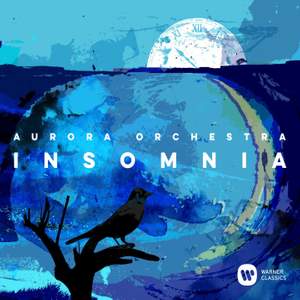Insomnia is the second Warner Classics album from the innovative, imaginative Aurora Orchestra and its Principal Conductor Nicholas Collon. In a typically colourful themed programme it explores the night, its thoughts and dreams and the hazy space between waking and sleeping. Britten’s Nocturne – with tenor Allan Clayton – and Brett Dean’s Pastoral Symphony are juxtaposed with music by Couperin, Ligeti, Gurney, The Beatles and R.E.M.
While its name evokes the dawn, the Aurora Orchestra has chosen to devote its second Warner Classics release to an exploration of a troubled night – its thoughts and dreams and the hazy space between waking and sleeping. The album carries a striking, but apt name: Insomnia.
The Aurora Orchestra, founded in London in 2005, enjoys a reputation for innovation and imagination as well as virtuosity. Under its Principal Conductor Nicholas Collon it introduced the Insomnia concept at concerts in the UK in 2013. As Collon has said: “A big feature of Aurora’s programming over the past few years has been playing around with a consciously eclectic vein of repertoire that can cover all periods, styles and genres ... We like the idea of an album having some kind of narrative and flavour, which is quite unusual for an orchestral CD. It allows for some interesting and unexpected repertoire to appear together, and to be presented in an unusual way.”
At the heart of Insomnia are two major works: Benjamin Britten’s Nocturne for tenor (here Allan Clayton, described by The Telegraph as a “rising star”) and chamber orchestra, which, composed in 1958, sets poetry by such figures as Shakespeare, Shelley and Tennyson; and the Pastoral Symphony by the contemporary Australian composer Brett Dean, which was premiered in Paris in 2001. Dean has described his piece as being “about glorious birdsong, the threat that it faces, the loss, and the soulless noise that we're left with when the birds are all gone”.
In typically enterprising fashion, the Aurora Orchestra has complemented these two central works with music from the 18th century – François Couperin’s keyboard piece Les baricades mistérieuses in a new arrangement by Thomas Adès – and from the 20th century – Ivor Gurney’s song Sleep and György Ligeti’s Poème symphonique (written for 100 ticking metronomes!). Joining them are versions of two pop songs: The Beatles’ ‘Blackbird’ and R.E.M.’s ‘I’ve Been High’. A bonus track, available from iTunes, is Samuel Barber’s gloriously lyrical song ‘Sure on this shining night’.
The Aurora Orchestra’s first Warner Classics Album, Road Trip, was released in early 2015. Featuring music by Aaron Copland, John Adams, Charles Ives and Nico Muhly, it took listeners, in the words of The Independent newspaper, on “an inspired American journey”. The Guardian wrote: “It is an imaginative and carefully thought out scheme, and certainly becomes a highly attractive package when it’s performed with the panache that the Aurora Orchestra and its conductor, Nicholas Collon, bring to everything.” BBC Music Magazine, which gave the disc five stars and named it Orchestral Choice, noted that: “Nicholas Collon’s young Aurora Orchestra has been creating a buzz on the London musical scene with its brilliant performances and its innovative programming. This America-themed disc, very well recorded, will enhance its reputation ... exhilarating ... a lovely performance, fresh in colouring and crisp in attack ... wonderfully atmospheric.”
It seems that, with the Aurora Orchestra and Insomnia, listeners can look forward to some surprisingly enjoyable sleepless nights …





